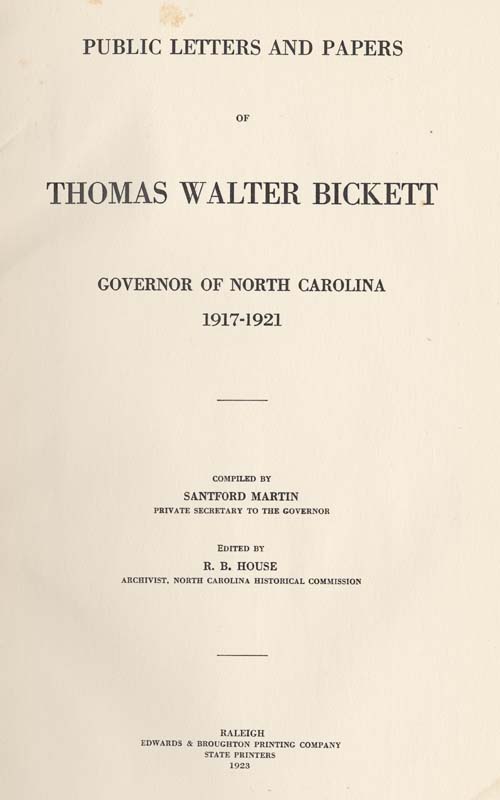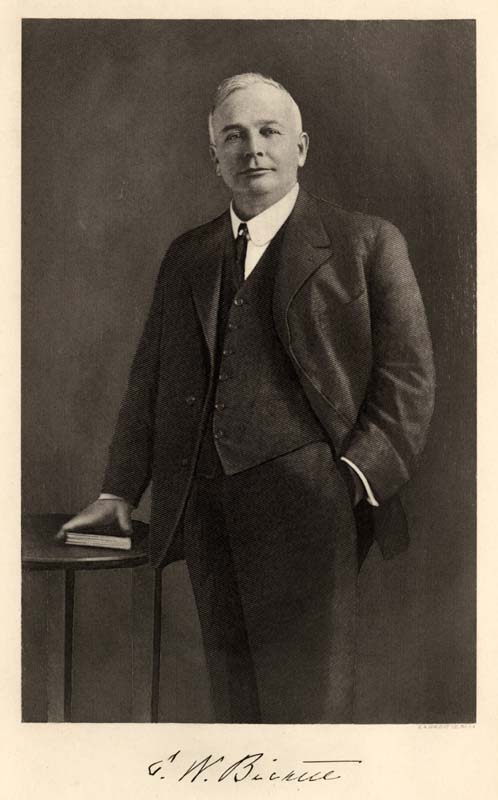A Call For Nurses:
Electronic Edition.
Bickett, Thomas Walter, 1869-1921
Funding from the State Library of North Carolina
supported the electronic publication of this title.
Text transcribed by
Apex Data Services, Inc.
Images scanned by
Melissa Meeks
Text encoded by
Apex Data Services, Inc., Melissa Meeks, and Jill Kuhn Sexton
First edition, 2002
ca. 15K
Academic Affairs Library, UNC-CH
University of North Carolina at Chapel Hill,
2002.
Source Description:
(caption title) A Call For Nurses.
Thomas Walter Bickett
137-138 p.,
Raleigh
Edwards & Broughton Printing Company
1923
Call number Uncataloged copy (North Carolina Collection, University of North Carolina at Chapel Hill)
Appears in Public letters and private papers of Thomas Walter Bickett. Governor of North Carolina, 1917-1921
The electronic edition is a part of the UNC-CH
digitization project, Documenting the American South.
The text has been entered using double-keying and verified against the original.
The text has been encoded using the
recommendations for Level 4 of the TEI in Libraries Guidelines.
Original grammar, punctuation, and spelling have been preserved. Encountered
typographical errors have been preserved, and appear in red type.
Any hyphens occurring in line breaks have been
removed, and the trailing part of a word has been joined to
the preceding line.
All quotation marks, em dashes and ampersand have been transcribed as
entity references.
All double right and left quotation marks are encoded as " and "
respectively.
All em dashes are encoded as --
Indentation in lines has not been preserved.
Running titles have not been preserved.
Spell-check and verification made against printed text using Author/Editor (SoftQuad) and Microsoft Word spell check programs.
Library of Congress Subject Headings
Languages Used:
- English
LC Subject Headings:
- World War, 1914-1918 -- North Carolina.
- World War, 1914-1918 -- Women -- North Carolina.
- Women in war -- North Carolina.
- World War, 1914-1918 -- Participation, Female.
- United States -- Armed Forces -- Nurses.
- Nurses -- North Carolina.
Revision History:
- 2002-05-09,
Celine Noel and Wanda Gunther
revised TEIHeader and created catalog record for the electronic edition.
-
2002-03-22,
Jill Kuhn Sexton
finished TEI-conformant encoding and final proofing.
-
2002-03-15,
Melissa Meeks
finished TEI/SGML encoding
- 2002-01-25,
Apex Data Services, Inc.
finished transcribing the text.
[Spine Image]
[Cover Image]
[Title Page Image]
[Frontispiece Image]
PUBLIC LETTERS AND PAPERS
OF
THOMAS WALTER BICKETT
GOVERNOR OF NORTH CAROLINA
1917-1921
COMPILED BY
SANTFORD MARTIN
PRIVATE SECRETARY TO THE GOVERNOR
EDITED BY
R. B. HOUSE
ARCHIVIST, NORTH CAROLINA HISTORICAL COMMISSION
RALEIGH
EDWARDS & BROUGHTON PRINTING COMPANY
STATE PRINTERS
1923
Page 137
(22)
A CALL FOR NURSES
RALEIGH, N. C., August 9, 1918.
To the Women of North Carolina:
I am just in receipt of an appeal that cannot be denied. It is an appeal from a patriotic woman to her sisters in North Carolina. Mrs. Claude Barbee, who writes this appeal, is herself a graduate nurse and regularly enrolled in the Red Cross service. She knows exactly what she is writing about, and what she says is entitled to the prayerful consideration of every young woman in North Carolina. I ask you to read every line that she has written, and sincerely trust that North Carolina will respond with a number greatly in excess of the 460 nurses that our Government is asking us to enroll.
Respectfully,
T. W. BICKETT, Governor.
[The communication of Mrs. Barbee is given below in full.]
DEAR GOVERNOR BICKETT:--
The Government is calling for 25,000 young women to join the United States Student Nurse Reserves, and hold themselves in readiness to train for service as nurses.
The war is creating an unprecedented demand for trained nurses. Only those who have taken the full training course are eligible for service with our forces overseas. These nurses are being drawn largely from our hospitals at home. Their places must be filled by student nurses enrolled for the full training course of from two to three years. Every young woman who enrolls in the United States Student Nurse Reserve is releasing a nurse for service at the front and swelling the home army which we must rely on to act as our second line of hospital defense. Upon the health of the American people will depend the spirit of their fighting forces.
WHAT THE TRAINING COURSE PREPARES FOR. At present every woman who completes satisfactorily her training in any accredited school is eligible for service to duty abroad. At the same time she will be qualified to earn her living in one of the noblest professions open to women. It should be remembered, furthermore, that her usefulness will begin not when she graduates from the training school, but as soon as she enters it. Practical nursing is a part of the work of every training school, and the student nurse is not only learning to serve, but serving her country from the outset. The country will need all the nurses that can be trained, not only during the war but after it, especially for reconstruction work. Even if the war ends within three years, every student nurse will be able to complete her training and will be needed.
AN HONORABLE SERVICE. Ever since the days of Florence Nightingale the nursing profession has been one of especial honor. It was never so honorable as it is today. The Army needs every nurse it can get to "keep up with the draft." The United States Student Nurse Reserve is equivalent for women to the great National Army training camps for soldiers. The Government will rely upon the student nurses to fight disease at home, to care for those injured and disabled in our hazardous war industries, and to make themselves ready to serve when the time comes as fully trained
Page 138
nurses, either abroad or at home. Let us show that we know how to answer the Government's call to the women of the country.
There exists now an extreme need for at least 25,000 women of character, intelligence and education to fill the gaps in our hospital staffs caused by the calling of many thousands of skilled nurses to the fighting front.
There is only one way to fill these gaps: by keeping our hospital training schools supplied with students, who are not only preparing for service abroad and at home at the end of their course and at the same time are equipping themselves to earn their living in one of the noblest professions, but from the very outset of their course are serving their country as well as learning.
The service which we are asking calls for the best that the womanhood of America can offer in courage, devotion, and resourcefulness. We cannot go forward to victory overseas if the wives and families of our fighters are not sustained in health and strength, if we do not protect our workers against the hazards of war industries, if we do not defeat accident and disease, our enemies at home. Upon the health of the American people will depend the spirit of their forces in the field.
It is probable that even with the ban removed from women with relatives in the Army, there will not be a sufficient number of nurses to meet the need "over there." The normal sickness among five million men, not including wounds in battle, is 100,000. That is the smallest percentage under normal conditions. Add to this the large casualty percentage, and we can ship all the trained nurses in the United States and still have too few to meet the need. It seems to me that this is one of the best ways in which women of strong bodies and steady minds can serve.
Respectfully yours,
MRS. CLAUDE BARBEE.
Return to Menu Page for A Call for Nurses by Thomas Walter Bickett
Return to North Carolinians and the Great War Home Page
Return to The North Carolina Experience Home Page
Return to Documenting the American South Home Page




